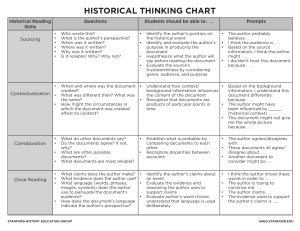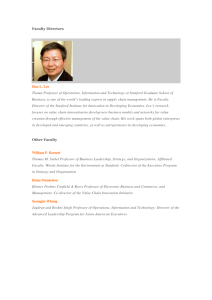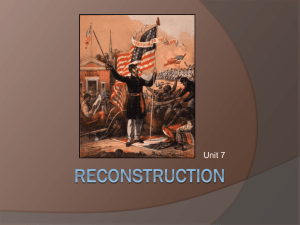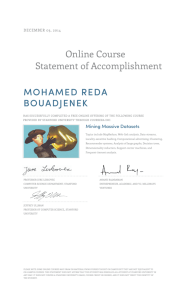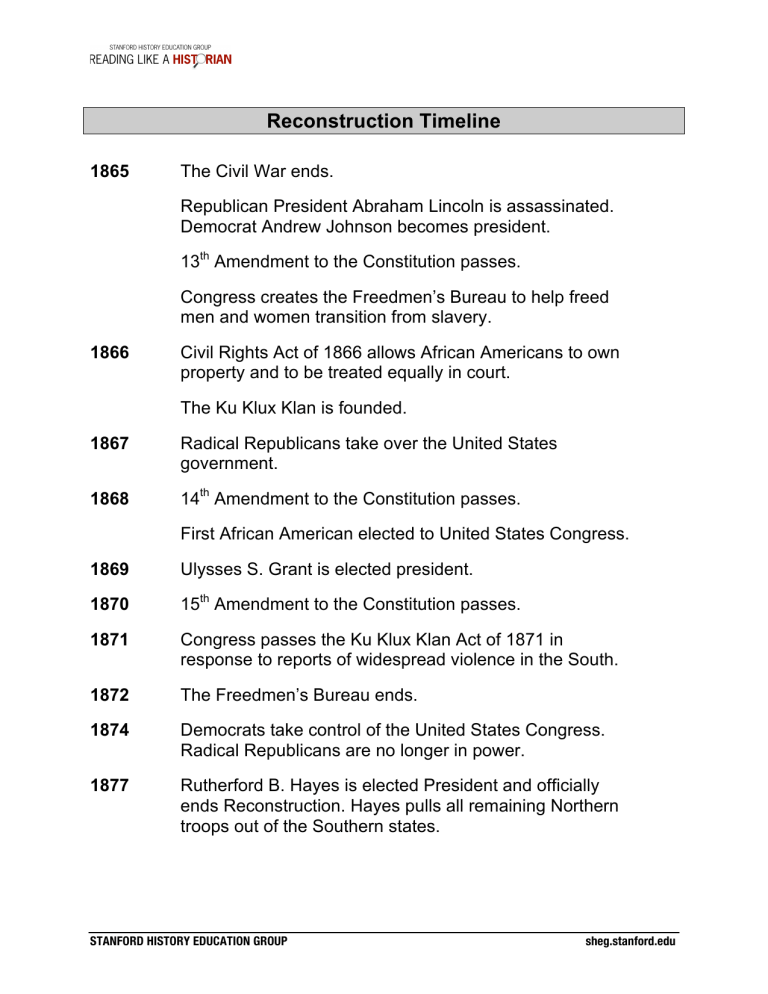
Reconstruction Timeline 1865 The Civil War ends. Republican President Abraham Lincoln is assassinated. Democrat Andrew Johnson becomes president. 13th Amendment to the Constitution passes. Congress creates the Freedmen’s Bureau to help freed men and women transition from slavery. 1866 Civil Rights Act of 1866 allows African Americans to own property and to be treated equally in court. The Ku Klux Klan is founded. 1867 Radical Republicans take over the United States government. 1868 14th Amendment to the Constitution passes. First African American elected to United States Congress. 1869 Ulysses S. Grant is elected president. 1870 15th Amendment to the Constitution passes. 1871 Congress passes the Ku Klux Klan Act of 1871 in response to reports of widespread violence in the South. 1872 The Freedmen’s Bureau ends. 1874 Democrats take control of the United States Congress. Radical Republicans are no longer in power. 1877 Rutherford B. Hayes is elected President and officially ends Reconstruction. Hayes pulls all remaining Northern troops out of the Southern states. STANFORD HISTORY EDUCATION GROUP sheg.stanford.edu Document A: The Reconstruction Amendments (Modified) The 13th, 14th and 15th amendments to the United States Constitution are sometimes called the “Reconstruction Amendments.” They were passed in order to abolish slavery and to establish the rights of former slaves. 13th Amendment: 1865 Section 1. Neither slavery nor involuntary servitude, except as a punishment for crime whereof the party shall have been duly convicted, shall exist within the United States, or any place subject to their jurisdiction. 14th Amendment: 1868 Section 1. All persons born or naturalized in the United States . . . are citizens of the United States and of the State wherein they reside. No State shall make or enforce any law which shall abridge the privileges or immunities of citizens of the United States; nor shall any State deprive any person of life, liberty, or property, without due process of law; nor deny to any person within its jurisdiction the equal protection of the laws. 15th Amendment: 1870 Section 1. The right of citizens of the United States to vote shall not be denied or abridged by the United States or by any State on account of race, color, or previous condition of servitude. Vocabulary jurisdiction: legal control naturalized: made citizens abridge: limit immunities: rights STANFORD HISTORY EDUCATION GROUP sheg.stanford.edu Document B: Black Codes (Modified) In the years following the Civil War, many Southern states and cities passed Black Codes. These laws laid out what freed blacks were and were not allowed to do. The document below, passed July 3, 1865, is a Black Code from Opelousas, Louisiana. SECTION 1. No negro shall be allowed to come within the limits of the town of Opelousas without special permission from his employers. SECTION 3. No negro shall be permitted to rent or keep a house within the limits of the town under any circumstances. SECTION 4. No negro shall reside within the limits of the town of Opelousas who is not in the regular service of some white person or former owner. SECTION 5. No public meetings of negroes shall be allowed within the limits of the town of Opelousas under any circumstances without the permission of the mayor or president of the board of police. This, however, does not prevent the freedmen from attending the usual church services. SECTION 7. No freedman who is not in the military service shall be allowed to carry firearms, or any kind of weapons, within the limits of the town of Opelousas without the special permission of his employer, in writing, and approved by the mayor or president of the board of police. SECTION 11. All the foregoing provisions apply to freedmen and freedwomen. Source: Black Code from Opelousas, Louisiana, July 3, 1865. Vocabulary reside: to live in STANFORD HISTORY EDUCATION GROUP sheg.stanford.edu Document C: Henry Adams Statement (Modified) In September 1865 I asked the boss to let me go to the city of Shreveport. He said, "All right, when will you come back?" I told him "next week." He said, "You had better carry a pass." I said, "I will see whether I am free by going without a pass." I met four white men about six miles south of town. One of them asked me who I belonged to. I told him no one. So him and two others struck me with a stick and told me they were going to kill me and every other Negro who told them that they did not belong to anyone. They left me and I then went on to Shreveport. I saw over twelve colored men and women, beat, shot and hung between there and Shreveport. Sunday I went back home. The boss was not at home. I asked the madam [the boss’s wife], "where was the boss?" She said, "You should say 'master'. You all are not free . . . and you shall call every white lady 'missus' and every white man 'master.'" During the same week the madam took a stick and beat one of the young colored girls, who was about fifteen years of age. The boss came the next day and whipped the same girl nearly to death. . . . After the whipping a large number of young colored people decided to leave that place for Shreveport. [On our way], out came about forty armed white men and shot at us and took my horse. They said they were going to kill every colored person they found leaving their masters. Source: Former slave Henry Adams made this statement before the U.S. Senate in 1880 about the early days of his freedom after the Civil War. STANFORD HISTORY EDUCATION GROUP sheg.stanford.edu Document D: Elected Black Officials during Reconstruction During Reconstruction, thousands of African Americans were elected to local and state governments throughout the Southern states. In addition, 17 African Americans were elected to the United States Congress from Southern states between 1870 and 1877. Here are photographs of 6 of these 17 elected officials. STANFORD HISTORY EDUCATION GROUP sheg.stanford.edu Document E: Education (Modified) In 1865 the United States government created the Freedmen’s Bureau to help former slaves in Southern states. The Freedmen’s Bureau helped people by providing medical supplies and health care and establishing schools. The creation of schools for former slaves was an important part of Reconstruction. Before the Civil War, Southern states outlawed the teaching of reading and writing to slaves. Many of the negroes . . . common plantation negroes, and day laborers in the towns and villages, were supporting little schools themselves. Everywhere I found them hoping to get their children into schools. I often noticed that workers in stores and men working in warehouses, and cart drivers on the streets, had spelling books with them, and were studying them during the time they were not working. Go outside any large town in the South, and walk among the negro housing, and you will see children and in many cases grown negroes, sitting in the sun alongside their cabins studying. Source: Sidney Andrews quoted in the Joint Report on Reconstruction, 1866. The document above is an excerpt from a report by a Northern white man to the United States government in 1866. STANFORD HISTORY EDUCATION GROUP sheg.stanford.edu
